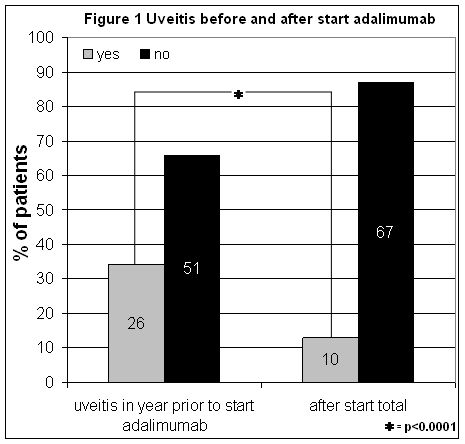Session Information
Session Type: Abstract Submissions (ACR)
Background/Purpose : A high percentage (30-40%) of patients with Ankylosing Spondylitis (AS) suffer from acute anterior uveitis (AAU) attacks. Local treatment with corticosteroids is a beneficial treatment, but not always sufficient. The objective of this study is to examine whether the use of adalimumab decreases the frequency of attacks of AAU in patients with AS, who receive this treatment for their spinal disease activity.
Methods : Consecutive AS patients, who were treated for at least 12 weeks with 40 mg of adalimumab every other week, were enrolled. The number of attacks of AAU in the year before start and during adalimumab treatment was assessed by ophthalmological controls at baseline and yearly thereafter. Follow-up ended at January First, 2012, or upon discontinuation of adalimumab treatment for any reason.
Results : In total 77 patients were enrolled of whom 67 (87%) were seen by the ophthalmologist at baseline and 44 (57%) during follow-up. The other data were retrieved from protocol visits to the research physician. Out of these 77 patients:
51 (66%) did not have attacks of uveitis in the year before (and during) treatment,
16 (21%) had uveitis before, but not during treatment,
10 (13%) had attacks of uveitis before and during treatment
No one developed uveitis for the first time during adalimumab treatment.
In total 26 patients (34%) suffered from recurrent flares of uveitis in the year before start of adalimumab treatment, with a median of 2.0 uveitis attacks per year (IQR: 1.0-3.5). The median follow-up period of all patients was 1.74 years (IQR: 0.80-2.57). During follow-up only 10 patients (13%) had attacks of uveitis with a median of 0.56 uveitis attacks per year (IQR: 0.30-0.75). This constitutes a 62% drop in the number of patients with uveitis attacks. The number of patients with uveitis as well as the number of attacks/year dropped significantly (p<0.0001), compared with the year before adalimumab. Even the patient with a very high number of attacks of AAU (12 attacks/year) was completely free of uveitis attacks after start of adalimumab, during his entire 4 years of follow-up.
Conclusion : A significant and substantial reduction of recurrence rate of flares of anterior uveitis during adalimumab treatment was found, even in patients with a high recurrence rate of attacks. The majority (87%) of patients remained completely free of uveitis attacks for the entire follow-up period.
Disclosure:
J. C. van Denderen,
None;
I. M. Visman,
None;
M. T. Nurmohamed,
MBS, MSD, Roche, Abbott, Pfizer and UCB,
5,
MBS, MSD, Roche, Abbott, Pfizer and UCB,
8;
M. S. A. Suttorp-Schulten,
None;
I. E. van der Horst-Bruinsma,
None.
« Back to 2012 ACR/ARHP Annual Meeting
ACR Meeting Abstracts - https://acrabstracts.org/abstract/adalimumab-significantly-reduces-recurrence-rate-of-anterior-uveitis-in-patients-with-ankylosing-spondylitis/

